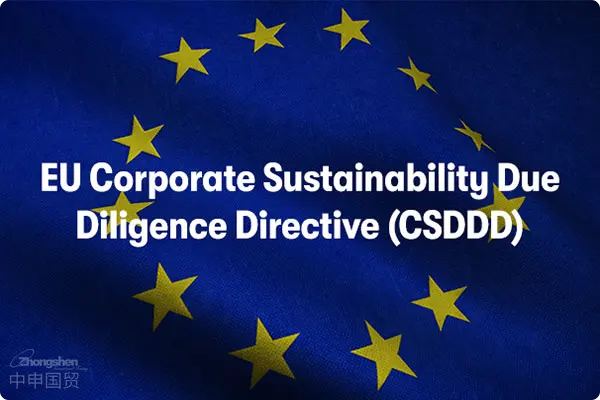- Shanghai Zhongshen International Trade Co., Ltd. - Two decades of trade agency expertise.
- Service Hotline: 139 1787 2118
After more than two years of planning, the EUs Corporate Sustainable Development Due Diligence Directive (referred to as CSDDD) failed to pass in the recent vote. According to Reuters and the South China Morning Post on the 28th, due to 13 member states including Germany and Italy abstaining, and Sweden opposing, this important bill, which is regarded as enhancing corporate responsibility and protecting human rights, failed to obtain the necessary majority support.

Although the Supply Chain Act does not directly target China, it will require major enterprises within the EU to conduct detailed due diligence on business partners in third countries. Given Chinas status as the EUs second - largest trading partner and its important position in the supply chain, the implementation of this act will undoubtedly have a significant impact on Chinese enterprises.
The rotating presidency of the Council of the European Union, Belgium, stated after the bill failed to pass that it would continue to consult with the European Parliament on the concerns of member states. However, the Forbes website pointed out that the Council of the European Union is under time pressure, with only two weeks to come up with an alternative plan, and the possibility of passing the bill before March 15 is extremely slim. As the European Parliament elections approach, the future of the bill is full of uncertainties and it has virtually ceased to exist.
The Supply Chain Act was proposed by the European Commission in February 2022. The aim is to integrate sustainable development goals such as human rights and the environment into global business activities and corporate supply chains, ensuring that EU companies maintain a competitive edge in the global supply chain. The bill aims to regulate enterprises in the supply chain and mandatorily disclose information, and its scope of influence is expected to extend to third - country enterprises that meet regulatory conditions.
According to the regulations, the bill will apply to EU companies with more than 500 employees and a global net turnover of over 150 million euros. These companies are required to identify and rectify issues such as forced labor, child labor, or environmental damage that may exist in the supply chain. Companies that violate the regulations may face a fine of up to 5% of their global sales. In addition, the rules are planned to further expand the scope of application three years after coming into effect, including non - EU companies with a net turnover of over 150 million euros in EU countries.
Germanys stance has had a decisive impact on the future of the bill. As early as January this year, when the draft of the Supply Chain Act was released, Germany clearly stated that it did not support this bill, and its refusal may have foreshadowed the result that the bill failed to pass.
With the suspension of the Supply Chain Act, the EUs legal framework for corporate due diligence remains in an uncertain state. In the future, the EU and its member states will need to find new ways to balance corporate responsibility and market freedom, while taking into account the reactions and cooperation attitudes of international trading partners.
Related Recommendations
? 2025. All Rights Reserved. 滬ICP備2023007705號(hào)-2  PSB Record: Shanghai No.31011502009912
PSB Record: Shanghai No.31011502009912









